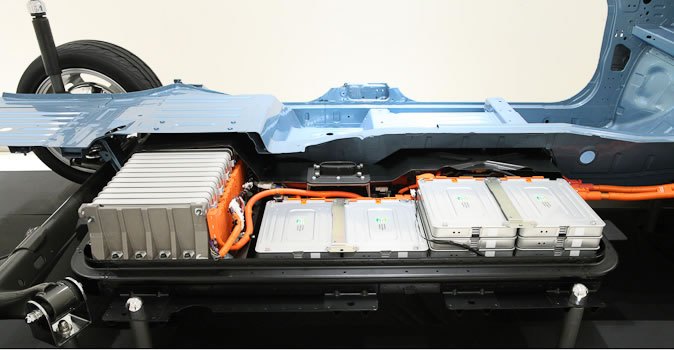#subsidies
Obama EV Credit-To-Rebate Plan Draws Opposition… From Democrats
President Obama’s goal of putting one million plug-in vehicles on the road by 2015 has faced serious challenges from day one, with several studies pointing out that the goal probably isn’t achievable without more government action. But up till now, President Obama has forwarded only one actual policy change aimed at achieving his goal, namely turning an existing $7,500 federal plug-in tax credit into a rebate, redeemable at the point of purchase (an idea first forwarded by Michigan Democrat Debbie Stabenow). This plan should help drive a Cash-for-Clunker-style EV buying frenzy, as the rebate would not be dependent on the buyer’s tax burden. But Automotive News [sub] reports that Senate Finance Committee Chairman Max Baucus (D-MT)
is very concerned [about the credit-to-rebate scheme] from an effectiveness standpoint.
Baucus doesn’t make a regular habit of opposing the President, but apparently his concerns about the Obama/Stabenow credit-to-rebate plan are serious enough for him to put politics aside.
New Ethanol Bill Faces Automaker Resistance
How things change in a few years! Just a few short orbits of the sun ago, automakers like GM were some of the biggest boosters of ethanol subsidies. Now, the Detroit News reports
The Alliance of Automobile Manufacturers – the trade association representing General Motors Co., Ford Motor Co., Chrysler Group LLC, Toyota Motor Corp. and eight others – opposes a bill sponsored by Sen. Tom Harkin, D-Iowa, that would require 90 percent of all vehicles to run on E85 – a blend of 85 percent ethanol – by the 2016 model year.
Shane Karr, vice president for government affairs, said the mandate “would cost consumers more than $2 billion per year” for flex fuel vehicles if automakers passed on the full cost “even though consumers will have little or no access to alternative fuels. Therefore, such a mandate is essentially a tax with little consumer benefit.”
In the face of this new opposition, the Renewable Fuels Association has even taken to employing the rhetoric of market economics to justify market-manipulating ethanol subsidies. And it doesn’t seem to be convincing anyone. If anything, Harkin’s bill may just hasten the death of existing subsidies, which are under pressure as both Democrats and Republicans seek to trim the federal budget.
DOE Loan Program Patronage Comes Under Attack
Edmunds Comes Out Against EV Tax Credits
Though it appears that it may take even more government stimulus to achieve President Obama’s goal of putting one million electric vehicles on the road by 2015, online auto juggernaut Edmunds has come out against existing EV tax credits in a commentary by CEO Jeremy Anwyl. Anwyl’s argument is rooted in the American Council for an Energy Efficient Economy‘s finding that the tax credit-qualifying Chevy Volt is only the 13th-greenest vehicle on the market while its greenest, the natural gas-powered Honda Civic GX, remains unsubsidized. Anwyl argues
The problem is this: When the government picks a technology, it crowds out development of other, potentially promising alternatives, like the natural gas engine used in the Honda Civic GX (above). LNG is not a new technology. I had friends who converted their vehicle to natural gas back in the Seventies. But how much are we hearing about it today? Or what about hydrogen fuel cells? A few years back, they were the stars of the major auto shows. Were any fuel-cell vehicles on display at the recent Detroit auto show? No. Every automaker was busy touting EVs.
Could GE's EV Mega-Buy Be Bad For Consumers?
The Auto Prophet brings up a point that completely escaped our discussion of General Electric’s EV mega-buy:
By gobbling up EVs, GE certainly helps to jump-start the industry, but they also gobble up future tax credits that consumers would have gotten, unless GE opts to forego the EV tax credit. Which would be bad business.
Yup, GE’s huge EV buy will be good for GE… but it won’t be so great for the 25,000 Americans whose tax credit will slurped up in the process. After all, the credit expires after a manufacturer sells 200k qualifying vehicles, so every credit GE uses brings GM and Nissan that much closer to the day they have to ask consumers to pay full price for their pricey EVs. No wonder GM is already pushing for an extension of the credit past 200k units.
Carlos Ghosn Sees His Shadow, Requires Two More Years Of EV Subsidies
No automaker has more to gain –and lose– in the early-adopter EV game than Renault-Nissan, and CEO Carlos Ghosn knows how the game is played. Nissan is investing $4b to rollout electric cars in the US, Japan and select Western European markets at the end of this year, but despite being committed, Ghosn insists that EVs aren’t ready to stand on their own yet.He tells Automotive News [sub] that
These are mature markets where governments give incentives to consumers. Two years of government support are needed to jump-start these markets and then the products will grow on their own and take offJapan Says Sayonara To Subsidies, Should Slump Sharply
After 13 months of rising car sales, Japan is looking into a deep, dark abyss. A government subsidy program will end any minute. Officially, the program runs through the end of September, but the funds have dried up. As of Monday, around 10.2 billion yen ($122m) were in the kitty. That’s about a day’s worth of subsidies.
Japan: Cities Will Pay You To Buy A Car
The Japanese auto industry is staring at the calendar like a rabbit at the snake. October 1, the rabbit will be dinner. October 1, government subsidies for purchases of “environmentally friendly vehicles” (read pretty much any new vehicle that passes Japanese rules) will be no more. According to popular wisdom, come October, the Japanese new car market that had enjoyed double digits growth rates, will go poof and implode.
So what to do in a country where with the exception of flu masks, the Top 10 list of popular products ”was dominated by low-priced retail merchandise and eco-friendly products as consumers pinched pennies and took advantage of government stimulus subsidies” as Reuters put it? Simple: Local subsidies.
Sky To Fall Down In Japan
Everybody in the Japanese auto biz (and who’s not in the auto biz in Japan, except my friends who, but that’s for another day), everybody in the Japanese auto biz has their eye on the sky. Why? Because the sky is soon to drop. On September 30, government subsidies for purchases of “environmentally friendly vehicles” (read pretty much any new vehicle that passes Japanese rules) will expire. Everybody expects a mad dash in August and September, and in October: Whammo. Down comes the sky.
What's Wrong With That Video? WTO Edition
Doesn’t it bug you when other countries give their carmakers money? Doesn’t it bug you a hell of a lot when other countries give their carmakers money with they express purpose to increase exports? Shouldn’t those felonious countries be dragged in front of the WTO and shot? Well, there are exceptions.
Nissan Leaf Battery Packs Break The $400/kWh Barrier
AutoblogGreen‘s Sam Abuelsamid earns a tip of the blogger’s hat today for making sense of a fascinating nugget in a Times of London piece on the Nissan Leaf. The revelation by Nissan EV honcho Andy Palmer to the British paper that Leaf battery packs cost £6,000 (about $9k) to produce could have been missed, buried as it was near the bottom of the story. Not only did Abuelsamid catch it, he calculated that the Leaf’s 24 kWh lithium-ion battery costs break down to a staggeringly cheap $375 per kWh. How cheap is that, relatively speaking? Apparently cheap enough to send Li-ion startup A123 Systems’ stock to record lows according to the WSJ [sub]. More price-comparison context and some insight into how Nissan might have beaten those costs down after the jump.
Japanese Auto Industry In The Grips Of Angst And Anxiety
Japan’s domestic car trade can look back at the first up year in seven years. Japan goes by the fiscal year, which spans from April 1 in the current year to March 31 in the next. In the 2009 fiscal, domestic sales of new vehicles rose 10 percent on the year. You think that’s an occasion to head down to your favorite Ginza hostess bar, break out the sake, or stronger stuff, and party like it’s 2003? Chigaimasu. Quite the opposite is true. The land of the rising sun is worried about falling sales. “A strong sense of anxiety continues to grip the industry,” reports The Nikkei [sub].
China To Seriously Subsidize EVs
China’s carmakers better get their pure plug-ins ready. The central government is set to spend serious money to electrify development and sales. China Daily reports that “a much-awaited government stimulus plan” is ready for government approval and should be in effect in the next couple of months.
Private buyers in five chosen cities (so far unveiled, but the usual suspects apply) will be able to collect close to $9000 if they buy a pure plug-in. Imports need not apply.























Recent Comments